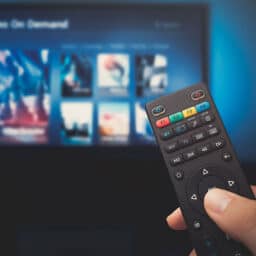Law360 (October 15, 2024, 3:41 PM EDT) — The Second Circuit on Tuesday endorsed a broad reading of a decades-old video privacy law in the modern internet age as it revived a proposed class action against the NBA by one of its free newsletter subscribers who claimed the league’s website unlawfully shared his viewing information with
Facebook.
A three-judge panel ordered the case brought by Michael Salazar back to New York federal court, finding that he’d shown that he is a “consumer” under the Video Privacy Protection Act and that he’d suffered an injury traditionally recognized by the courts.
The case has been closely watched amid a wave of litigation nationwide against website operators that share users’ personal viewing information with third parties like Facebook owner Meta. The U.S. Chamber of Commerce supported the NBA’s arguments in a December brief, saying the legislative history showed that the law was meant to protect video renters, and not those who “bought separate products from stores that happen to sell videos.”
Congress passed the VPPA after a Washington, D.C., newspaper published an article in 1987 ahead of Senate hearings on Robert Bork’s nomination to the U.S. Supreme Court
about 146 films that the then-D.C. Circuit judge had rented from a video store. The language of the law has remained largely unchanged despite extreme changes in the way people consume video content, Tuesday’s opinion said.
“The VPPA is no dinosaur statute,” the panel wrote. “Congress deployed broad language in defining the term ‘consumer,’ showing it did not intend for the VPPA to gather dust next to our VHS tapes. Our modern means of consuming content may be different, but the VPPA’s privacy protections remain as robust today as they were in 1988.”
The VPPA defines a consumer as “any renter, purchaser, or subscriber of goods or services from a video tape service provider.” Tuesday’s opinion was the first time that the Second Circuit addressed what counts as a “subscriber” and “goods and services.”
The decision vacated an order by U.S. District Judge Jennifer Rochon, who dismissed the case in August 2023 on the reasoning that Salazar’s subscription to NBA.com’s free newsletter did not make him a subscriber to the site’s video service.
“The phrase ‘goods or services’ in the VPPA is not cabined to audiovisual goods or services, but also reaches the NBA’s online newsletter,” the panel said. “By alleging that he exchanged personal information in return for periodically receiving the online newsletter, Salazar plausibly pled that he isa ‘subscriber of’ that newsletter.”
The NBA had argued that the Second Circuit should leave Judge Rochon’s order untouched, arguing that the VPPA’s language requires that a consumer must specifically rent, purchase or subscribe to audiovisual goods or services. But the appeals court agreed with Salazar that the language of the law shows that Congress did not intend for it to be so limited.
Congress used very broad language when defining “video tape service provider” in the statute as anyone engaged in business with “video cassette tapes or similar audio visual materials,” the panel said. The law did not use the term “audiovisual materials” when defining “consumer,” and the panel found that “this meaningful variation shows that Congress knew to include an audiovisual limitation in the VPPA when it wanted one to apply.”
The NBA’s arguments were “hard to harmonize” with other language in the statute, the panel said, adding that they were not persuaded that the term “goods and services” was only meant to apply to audiovisual goods and services.
“Thus, by its plain terms, the statute applies equally to a business dealing primarily in audiovisual materials (think Blockbuster) and one dealing in primarily non-audiovisual materials (think a general store that rents out a few movies),” the order said. “Congress cast a wide net in defining ‘video tape service provider,’ to ensure that businesses dealing in audiovisual goods or services satisfy the definition even if they also deal in non-audiovisual goods or services.”
The VPPA’s reach is not all-encompassing, the panel said, illustrating this point with a hypothetical that a general store owner who rents out a few movies would not be liable for disclosing a customer’s bread-buying habits. The panel also described its decision as “narrow,” focusing on the merits of Salazar’s claim to be a “subscriber of goods and services.”
Salazar qualifies as a subscriber under the statute’s text even though the NBA content he consumed was free, as there are many examples of subscriptions that don’t require payment, the panel said. For example, one can subscribe to YouTube channels with the click of a button.
Salazar sued the NBA in September 2022, claiming the NBA violated the VPPA by allowing a “tracking pixel” installed on its website to harvest information related to what he was watching and his Facebook account ID.
“Now that we can proceed, we look forward to a full-court press in the district court to show just how invasive the NBA’s use of Facebook’s tracking software is,” Salazar counsel Brandon Wise of Peiffer Wolf Carr Kane Conway & Wise LLP said in a statement. “At the end of the day the Second Circuit has spoken: the VPPA means what it says, and attempting to add additional requirements is judicial error.”
An attorney for the NBA did not immediately respond to requests for comment. Salazar is represented by Joshua Hammack and Michael Murphy of Bailey & Glasser LLP and Brandon Wise of Peiffer Wolf Carr Kane Conway & Wise LLP.
The NBA is represented by Matthew Etchemendy, Hilary Preston and Marisa Antonelli of Vinson &Elkins LLP.
The case is Salazar v. National Basketball Association, case number 23-1147, in the U.S. Court of Appeals for the Second Circuit.
Source: Law 360 October 15 2024







